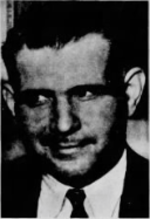 The Philadelphia Inquirer, July 27, 1941. On October 17, 1937, the bodies of the elderly Dr. James G. Littlefield and his wife, Lydia Littlefield, were found in back of their car in North Arlington, New Jersey. The North Arlington police had noticed the parked car and found a sleeping teenager sitting in the driver’s seat. They shook the driver, eighteen-year-old Paul “Buddy” Dwyer, awake. In doing so, they spotted the dead body of Mrs. Littlefield in the backseat and soon found Dr. Littlefield’s body in the trunk. Both Dwyer and the Littlefields were residents of South Paris, Maine. Dwyer quickly confessed to the bludgeoning and strangulation of Dr. Littlefield and the strangulation of Mrs. Littlefield, claiming robbery as his motive. After pleading guilty in November 1937, Dwyer was sentenced to life in prison for Dr. Littlefield’s murder. However, the following year, Dwyer changed his story when talking with the warden, John H. Welch, at the prison where he was incarcerated. Dwyer told Welch that he previously dated a teenage girl named Barbara Carroll, whose father, Francis M. Carroll, was the Deputy Sheriff in South Paris, Maine. Dwyer claimed that Francis Carroll had an incestuous relationship with Barbara and that Dr. Littlefield had become aware of the abuse Barbara was allegedly suffering at the hands of her father. Dwyer attested that Dr. Littlefield had threatened to send Francis Carroll to prison, which had prompted Francis Carroll to kill Dr. Littlefield on October 13, 1937, and Mrs. Littlefield on October 14, 1937, in order to avoid the exposure of Carroll’s crimes against his daughter. Dwyer said that Carroll then forced Dwyer to drive off with the bodies. Dwyer claimed to have pleaded guilty out of fear for his own life and that of his mother. Between the time of Dwyer’s conviction and his statements to Warden Welch, Francis Carroll had been arrested on a morals charge involving his daughter Barbara. Based on Dwyer’s statements to Warden Welch, Francis Carroll was indicted for the murders of Dr. and Mrs. Littlefield. Special Prosecutor Ralph M. Ingalls was appointed to handle the case. At Carroll’s trial in August 1938, Dwyer’s defense attorney testified that Dwyer had told him several times that Carroll was responsible for the Littlefield murders. Carroll took the stand at trial and provided alibi witnesses to support his story that he was at an American Legion supper the night of Dr. Littlefield’s murder, and then went straight to the sheriff’s office and later to a friend’s home. Carroll admitted in his testimony that he often carried a cigarette lighter similar to one found at the scene of the crime and that he no longer had possession of the lighter. Barbara Carroll did not testify at the trial, which Ingalls was quick to point out to the jury. She did, however, sign autographs on postcards featuring the courthouse during the court recess on the day her father testified. On August 12, 1938, Francis Carroll was sentenced to hard labor for life for the murder of Dr. Littlefield. Carroll was incarcerated in the same facility as Dwyer. There was a movement to free Dwyer based on Carroll’s conviction, but the State did not agree, and both men remained in prison. Twelve years later, Carroll was granted a hearing for a new trial based on evidence from a retired state police ballistics expert, Leon P. Shepard, among others. In August 1950, the hearing began with testimony from Shepard, who stated that on the orders of Special Prosecutor Ralph M. Ingalls, Shepard had tried very hard, albeit unsuccessfully, to make the grip marks on Carroll’s gun fit the marks on Dr. Littlefield’s head. He quoted Ingalls as saying “make the damned thing fit.” Shepard also testified that after examining the murder scene, he had concluded that only Dwyer and Littlefield had been there, and he said he had informed prosecutors of this belief prior to Carroll’s trial, but this evidence had been suppressed. A county attorney testified that Ingalls dismissed him from the prosecuting staff because he had permitted Carroll to see a potential defense attorney. Sidney Verrill, who had also been a deputy sheriff in South Paris at the time of the crime and who had provided testimony at Carroll’s trial, also testified at the hearing, but his testimony was not made public. Superior Court Justice Albert Beliveau granted Carroll a writ of habeas corpus on September 20, 1950, and Carroll was released from prison. Beliveau stated that evidence had been suppressed as well as manufactured by the prosecution, and that Carroll’s constitutional rights had been violated. Following his release, Carroll returned to the job he had previously held at a furniture plant. He sought $156,000 in compensation from the state of Maine, but his request was denied. In October 1956, he died of a heart ailment at the age of sixty. In 1959, Paul Dwyer was paroled at the age of 40. - Meghan Barrett Cousino
|